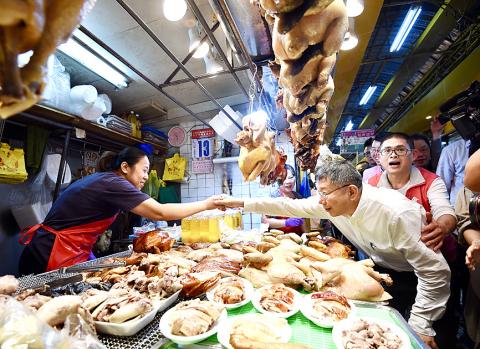Taipei Mayor Ko Wen-je (柯文哲) yesterday said he might have the weakest election campaign team, as he does not have the support of a political party, but added that his team still has 10 days before the nine-in-one elections to bring out the best result.
Ko, an independent seeking re-election, took leave from his post as Taipei mayor on Thursday last week to focus on his re-election campaign in the run-up to the Nov. 24 vote.
In response to media queries about his thoughts after canvassing support over the past few days, Ko said: “We are doing our best,” adding that he has visited several traditional markets, night markets and given speeches at companies from 7am to 10pm nearly every day.

Photo: Peter Lo, Taipei Times
“Frankly speaking, it is very difficult for independent candidates to run in an election, because there are still some basic techniques required to run a campaign,” he said, adding that having the support of a political party could increase a candidate’s votes by at least 5 percent.
“Our election campaign team could be called the weakest campaign team ever or might not even qualify as a campaign team, because they are mostly young people recruited through an audition and we do not have specialists to help with promotional broadcasts,” he said.
Ko said he learned about “plate theory” from a survey analyst who used “plates” as a metaphor for supporters of different camps.
He has been thinking about why the plates have significantly shifted since 2014, Ko said, adding that he thinks it was because Taiwanese often vote for a political party not because they like it, but because they hate the rival party.
“However, they often regret after voting, because other than their stances on unification or independence and a few ideologies, the two major parties are very similar,” he said, referring to the Democratic Progressive Party (DPP) and the Chinese Nationalist Party (KMT).
“Taiwan’s political scene has been overshadowed by the debate over unification or independence for about two decades, but I think it is a non-issue,” Ko said.
“It is impossible for the US to allow Taiwan to unify with China; it will try to avoid it, but the US will also not allow Taiwan to declare independence and infuriate China, so the debate is actually a pseudo-issue about fake unification and fake independence,” he said.
However, he added that although it is a pseudo-issue, it has real effects on the nation’s politics, such as the controversy over his campaign director Hsiao Yeh (小野) appearing in a video promoting DPP Kaohsiung mayoral candidate Chen Chi-mai (陳其邁), which Ko said triggered nerves in the pan-blue and pan-green camps, and shifted the “plates.”
When asked if he regrets having the “weakest campaign team,” Ko said he does not, because he wants to give young people an opportunity to be innovative.
He was nervous about letting a team of young people mostly under 35 organize the opening ceremony of last year’s Taipei Summer Universiade, “but they did an outstanding job,” Ko said.

A strong continental cold air mass is to bring pollutants to Taiwan from tomorrow, the Ministry of Environment said today, as it issued an “orange” air quality alert for most of the country. All of Taiwan except for Hualien and Taitung counties is to be under an “orange” air quality alert tomorrow, indicating air quality that is unhealthy for sensitive groups. In China, areas from Shandong to Shanghai have been enveloped in haze since Saturday, the ministry said in a news release. Yesterday, hourly concentrations of PM2.5 in these areas ranged from 65 to 160 micrograms per cubic meter (mg/m³), and pollutants were

Taiwan’s armed forces have established response protocols for a wide range of sudden contingencies, including the “Wan Chun Plan” to protect the head of state, the Ministry of Defense (MND) said today. After US President Donald Trump on Saturday launched a series of airstrikes in Venezuela and kidnapped Venezuelan President Nicolas Maduro, concerns have been raised as to whether China would launch a similar “decapitation strike” on Taiwan. The armed forces regularly coordinate with relevant agencies and practice drills to ensure preparedness for a wide range of scenarios, Vice Minister of National Defense Hsu Szu-chien (徐斯儉) told reporters before a

EVA Airways on Saturday said that it had suspended a pilot and opened an investigation after he allegedly lost his temper and punched the first officer several times as their plane was taxiing before takeoff at Los Angeles International Airport. According to a report published on Thursday by The Reporter, the incident occurred after the flight’s Malaysian first officer tried to warn the Taiwanese pilot, surnamed Wen (文), that he was taxiing faster than the speed limit of 30 knots (55.6kph). After alerting the pilot several times without response, the first officer manually applied the brakes in accordance with standard operating

NOT AN OPENING: Trump’s violation of international law does not affect China’s consideration in attacking Taiwan; Beijing lacks capability, not precedent, an official said Taiwanese officials see the US’ capture of the president of Venezuela as a powerful deterrent to Beijing’s aggression and a timely reminder of the US’ ability to defeat militaries equipped with Chinese-made weapons. The strikes that toppled Venezuelan President Nicolas Maduro signaled to authoritarian leaders, including Chinese President Xi Jinping (習近平), US President Donald Trump’s willingness to use military might for international affairs core to US interests, one senior official in Taipei’s security circle said. That reassured Taiwan, the person said. Taipei has also dismissed the idea that Trump’s apparent violation of international law could embolden Beijing, said the official, who was not